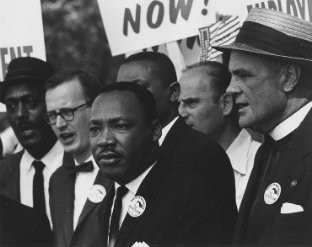Converted in 1963

Fifty years ago I had a conversion experience. It was the summer of the March on Washington and Martin Luther King Jr.’s “I Have a Dream” speech. John F. Kennedy was president. I found my political inclinations moving left.
The move was partly an aesthetic matter at first. Kennedy was personally attractive and a decorated war hero, and he had a beautiful wife and children. But his book Profiles in Courage, about American politicians who had voted their conscience against prevailing public opinion and paid the price, also captivated my imagination. Dietrich Bonhoeffer’s The Cost of Discipleship and his own personal martyrdom had shown the radical social and political implications of following Jesus. Kennedy’s book seemed a secular illustration of Bonhoeffer’s point.
Kennedy talked about public service in almost religiously vocational terms and articulated a vision of government as a potential instrument for justice.
I was ordained two months before the March on Washington, and I wanted desperately to go to Washington along with a group of pastors. But I was married, with two young children, and had no money for bus fare and meals, so I didn’t go. I have rued it ever since. I watched the speech on television.
Read our latest issue or browse back issues.
We know now that the speech was a masterpiece, grounded in history, social science, scripture and theology. In an act of sheer courage, or of Spirit-filled faith, King left his prepared speech when Mahalia Jackson, standing behind him, said, “Tell ’em about the dream, Martin.”
What followed was both a rhetorical tour de force and an illustration of the power of the Spirit, particularly for those of us who wouldn’t think of leaving our manuscripts even if Mahalia Jackson told us to. It was, in fact, a sermon. It convinced me that Christian faith led to involvement in the world, not retreat from it, that the security, welfare and equal opportunity of all people were priorities for the God revealed in the Bible—and therefore priorities for the church.
That argument was not universally applauded, not by a long shot. Many people accused King and those who supported him of politicizing Christianity, inappropriately mixing religion and politics and endangering the financial security of the church. Evangelical friends who are now completely on board with the cause were either silent about racial justice at the time or viewed the issue as a distraction from the gospel.
In the new issue of the Century, Theo Hobson differentiates between good liberalism, which affirms “a deep affinity between the gospel and political and social liberty,” and bad liberalism, which “seeks to reform Christianity in the direction of rationalism and optimism about natural human capacities.”
I became a good liberal in the summer of 1963. I believed, and continue to believe, that the welfare of all is the shared responsibility of all, that government has a role in protecting individual liberty and guaranteeing the equal treatment of all citizens. I think that government can be a force for good. To that degree, I am a liberal not in spite of my faith in Jesus Christ but because of it.






